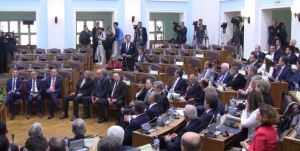nsnbc : Lawmakers at Montenegro’s parliament, on Friday voted in favor of joining NATO. The decision was made as opposition lawmakers, who have boycotted parliament in recent months, protested outside parliament. Russia expressed concerns while NATO welcomed the decision.
 46 out of 81 lawmakers voted in the capital Cetinje to ratify the treaty with the North Atlantic Treaty Organization (NATO / OTAN). Opposition lawmakers and several hundred supporters protested outside before and during the vote. Members of the opposition did not participate in the voting and have thus abstained.
46 out of 81 lawmakers voted in the capital Cetinje to ratify the treaty with the North Atlantic Treaty Organization (NATO / OTAN). Opposition lawmakers and several hundred supporters protested outside before and during the vote. Members of the opposition did not participate in the voting and have thus abstained.
While NATO welcomed the decision, it caused anxiety in Russia as Montenegro as well as Serbia belong to what long has been considered as Moscow’s sphere of interest. The conflicting interests of most NATO constituent members and Russia is also reflected in tensions between the government and the opposition, respectively.
The Montenegrin government has accused Russia of being behind a foiled (some say alleged) Election Day coup in October, allegedly designed to throw the country off its path toward NATO. Russia has denied the accusations. Actual, journalistically independently testable evidence is sparse at best and reporting about the “alleged facts” differs considerably, depending on media and their respective propensity to either repeat Russian or NATO “narratives”. It is one of these cases where responsible journalism would be to admit “we don’t know” and to concede that “one may have to wait 25, 50, or 75 years before currently classified documents can be reviewed by historians”.
Montenegrin Prime Minister Dusko Markovic told lawmakers that NATO membership was a guarantee for Montenegro’s future security, economic progress and regional stability. Addressing parliament he added
“This assembly and its members have a historic privilege to make a decision that will be remembered as long as there is Montenegro and Montenegrins. … This day will be marked among the brightest in our history.”
Markovic said Montenegro was drawn into Serbia’s war with NATO and that membership in the alliance would help prevent anything like that from happening again. “NATO and the EU have always been and remain a guarantee of stability and security and cooperation and the main basis for peace in Europe,” Markovic said. “It is about what kind of future we choose for us and generations to come,” he said. Montenegro was formally invited to join NATO in December 2015. Markovic said 27 out of 28 NATO member states have ratified Montenegro’s entry protocol and Spain would do so in the coming weeks. Montenegro gained independence from Serbia in 2006.
Markovic’s predecessor, Milo Djukanovic, who headed government during the alleged coup attempt in October 2016 said joining NATO was the most important decision in recent Montenegrin history. The alleged coup attempt allegedly also included plans to assassinate Djukanovich who added “After long suffering and roaming through history, (Montenegro) is finally in the position where it logically, historically, civilization-wise and culturally belongs.”
Outside parliament anti-NATO protestors chanted slogans such as – treason – thieves – and one banner read “NATO murderers your hands are bloody”. A NATO flag was unceremoniously burned. The protests were, however, peaceful and dignified. Former Montenegrin President Momir Bulatovic said “I feel humiliated because others are making a decision in my name. … What is happening now is triumph by force and lies!”
Opposition leaders said they won’t recognize the parliamentary ratification of the NATO accession and will call a referendum on the issue. Another option would be that they win future elections and call for a referendum on the issue in the future. The small Balkan country of 620,000 has been historically divided between pursuing pro-Western policies and sticking to an alliance with Orthodox Christian allies Serbia and Russia. That said, Montenegro, as small as it is, is of great strategic importance for Serbia (and by extension Russia) in as much as Monenegro could potentially deny Serbia access to the Adriatic and the Mediterranean Seas.
The Montenegrin opposition and NATO opponents also invoked NATO’s (arguably illegal) bombing of Yugoslavia in 1999 which included Serbia and Montenegro at the time, plus NATO’s role in Kosovo as a reason not to become a member of the Alliance. While NATO and the governments of most if not all constituent members welcome the Montenegrin decision, Russia insists that NATO’s eastward expansion has significantly contributed to the growth of tensions in Europe.
CH/L – nsnbc 29.04.2017
Source Article from https://nsnbc.me/2017/04/29/amidst-parliamentary-hiatus-montenegro-voted-for-joining-nato/
Related posts:
Views: 0
 RSS Feed
RSS Feed

















 April 29th, 2017
April 29th, 2017  Awake Goy
Awake Goy 










 Posted in
Posted in  Tags:
Tags: 
















